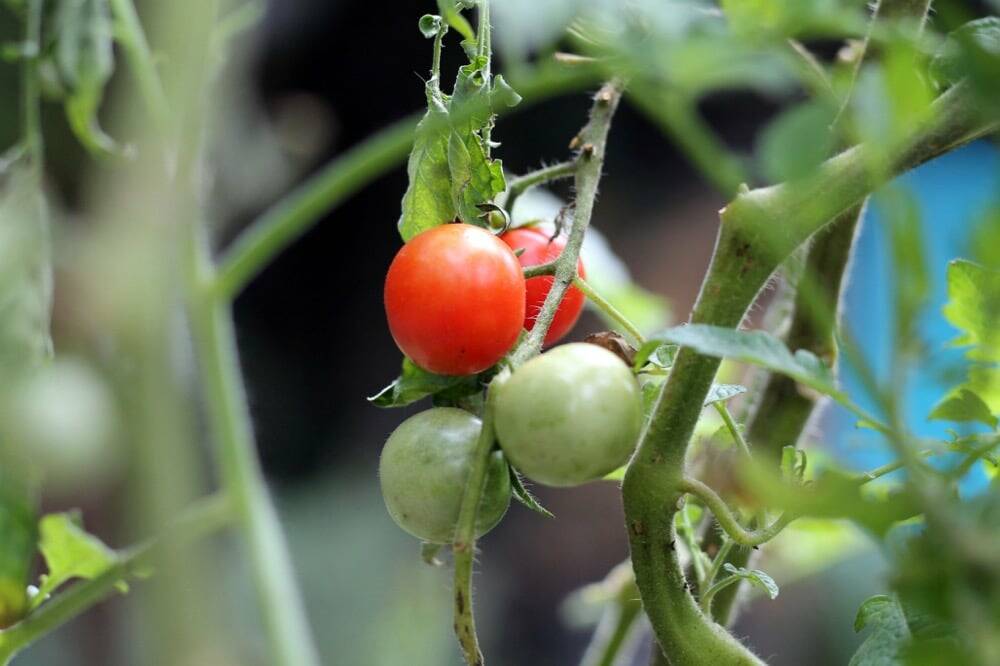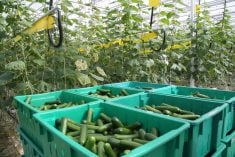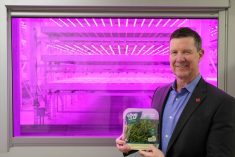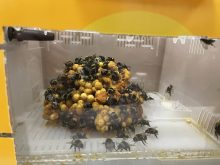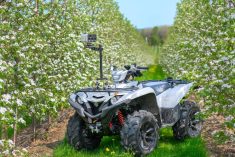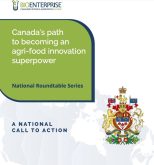A biofungicide for vegetable crops is being tested under real-farm conditions thanks to funding from Natural Product Canada after promising early trial results.
Why it matters: Chemical controls are becoming limited, leaving growers with less options. Product resistance is also a growing problem.
“If we want a resilient agriculture system in Canada, we need to get products that will help the plant, but also increase nutrition and prevent sickness,” said BioSun CEO Nicolas Ste-Marie.
Quebec-based BioSun’s initial product is CelexT07. It contains five elicitors or molecules drawn from medicinal plants that can stimulate and over-express a minimum of 33 genes in plants.
Read Also

Claas brings 1000 Series SP forage harvesters to Canada
In mid-August, Claas unveiled its new line of Jaguar forage harvesters at an event in Visalia, California, deep in the heart of that state’s dairy region.
This is important, said Ste-Marie, because ongoing stress on a gene or range of genes in a plant means they will slowly turn themselves off and won’t reactivate in that crop or crop cycle until they are given a signal from an elicitor.
“Only a few businesses right now are working on how to stimulate the genes of plants,” he said, adding that most companies focus on big crops like corn, wheat and soybeans and sell elicitor products one by one to solve individual problems.
BioSun has found a niche developing its products for high value horticulture crops. The company was founded in Montreal in 2019 and originally worked with fungal diseases affecting humans and animals.
Early trials at McGill University successfully and very rapidly treated human fungal disease. Further work at McGill’s Faculty of Agricultural and Environmental Science showed 100 per cent success in treating fungal disease in cucumbers and tomatoes.
“So we turned to agriculture. The market is much bigger and disease in that industry is a world-wide problem,” said Ste-Marie. This led to further research in Quebec and France to help isolate the molecules behind the impressive results.
Some of them include jasmonic acid, a plant hormone and signaling molecule; a PR protein that fills in fibrous parts of leaf so fungal spores can’t take hold; and ethylene, which controls the speed of crop ripening.
“If you grow tomatoes for example, and it is very cloudy, the crop won’t be ready for harvest on time even though you have orders you have to fill,” he said.
“Ethylene stimulates plants to ripen on time, which is really important for a country like Canada when we don’t know what the weather will do.”
The genes BioSun is targeting are common to every plant species, and researchers have found increases in yield, plant growth and even flavour and nutrition in crops as diverse as wine grapes, rice, orchids, tomatoes and Christmas trees.
Commercialization started in January 2024 and BioSun has signed distribution agreements for approximately 30 countries including United Arab Emirates, Saudi Arabia, Morocco, Algeria, Costa Rica and several Caribbean nations.
“Last year in Trinidad and Tobago where they normally harvest 45 kilograms per row of rice we ended up with an average of 210 to 230 kilograms per row,” said Ste-Marie. “It was also the first time in the Caribbean with rice of such high nutritional value and so much yield — this is tremendous for a country like Trinidad.”
In Canada, distribution is through Dubois AgriInnovation and according to Ste-Marie, BioSun is working directly with the country’s largest produce growers.
The project funded by NPC is to help bring a new product called Planticare to market, which is similar to CelexT07 but at a different concentration. Work has been underway in Quebec and France for the last six years, but this last phase will look at any potential impacts on nature through on-farm trials prior to final approval.
If approved, the product will be registered as a non-conventional fungicide, which means no restrictions around storage, maximum number of applications or PPE use making it easier for growers, said Ste-Marie.
BioSun has also received funding from Genome Canada, Mitacs, Genome Quebec, Consortium de recherche et innovations en bioprocedes industriels au Quebec and Natural Sciences Engineering Research Council.

